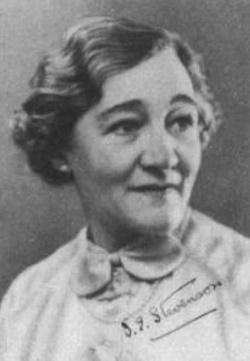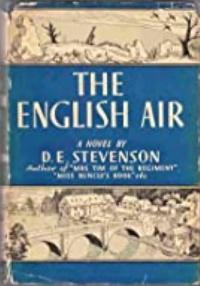Book review by Mary G: When I read that D. E. Stevenson came from the same family as Robert Louis Stevenson and wrote romantic novels, I immediately assumed, mistakenly, that she would have much in common with O. Douglas, sister of John Buchan and author of 15 novels some of which had romantic plots. They lived about 20 miles apart in the Scottish borders though O. Douglas was born a generation earlier than Dorothy Stevenson. They both assume similar cultural knowledge in their readers and to some extent are rooted in similar social worlds: members of both families were educated professionals with links to the British Empire. Stevenson’s husband was a major with a Gurkha regiment and O. Douglas’s brother became Governor General of Canada.
 D.E. Stevenson
D.E. Stevenson
Stevenson’s 45 novels are, like Douglas’ s at home with domestic settings but Stevenson’s are more concerned with the way in which a sense of home is heightened or changed by encounters with those to whom this sanctuary is a strange and possibly threatening world.
I chose to read these two novels, Peter West, Stevenson’s first novel published in 1923 and then her thirteenth, The English Air, 1940, in order to explore how this Scottish author represented Englishness. The date and titles of both suggested that cultural distinctions between the two countries would be examined and they were.
The hero of Peter West is an Englishman though his family have lived in the Scottish Borders for a generation. The novel is set in the years following the First World War, in which Peter West has been wounded. It tells of the hero’s love for the daughter of a brutal boatman whose narrow religious creed and limited human sympathies force her into a loveless marriage. Peter himself marries a woman whose mental instability soon overwhelms her and leads to her death.
The Englishness of the hero is associated with bookishness, physical fragility but with a strong connection with public events and political realities. Peter is a part-time diplomat who quietly disappears occasionally to troubled parts of post-war Europe. The couple are parted even when both are freed from unhappy marital bonds by the death of their partners. Bess is reluctant to be dependent on a man more wealthy and more privileged than herself. She also seeks to avoid village gossip that she and Peter might have been lovers throughout their unhappy marriages. Though Peter is shown to be scrupulous and passionate, Bess asserts her moral and economic independence from him by moving to London on the death of her husband and earning her living by working in a shop. She only returns to Scotland to nurse her dying father and the book ends with her acceptance of Peter’s love now that she has demonstrated that she is not dependent on him. But he must first hurry off to prevent a European conflict.
Though we see little of the interior of Peter’s mansion, Peter himself is aware of how he is perceived by the Scottish village community, so much less comfortably off themselves: “By Jove, I should hate Peter West if I were they” he thought whimsically. His kindly and socially gifted mother had been accepted in the village but he feels much less secure.

The attractions of a maternal middle-aged English woman are even more important in Stevenson’s 1940 novel The English Air. There are two sets of romantic relationship in this later novel: one between the maternal mother, a widow, and a male friend who has moved into the house in the Home Counties to sort out her practical affairs. He, like Peter West, is a covert diplomat, trying in 1938 to avert the forthcoming war. His guardianship enables the widow to create a social haven for all the young people in her daughter’s social set who seem to be busy playing tennis with each other, oblivious to the approaching conflict.
The second romance plays out between the widow’s eighteen year old daughter and the son of an English friend who had married a German. The mother of the boy has died of ill treatment by her fascist German husband who has come to feel shame at his connection with the English race. The young half-German, Franz, has come to England, not exactly as a spy, but at his father’s request to understand the enemy. In so doing he falls in love with the apparently frivolous tennis playing daughter of the widow. His love is returned. The drama in the novel is derived from Franz’s misperception that the jollity of the young English adults indicates a lack of seriousness. The English Air of the title, is demonstrated, by the end of the novel to engender a wideness of sympathy, bags of energy and an ability to combine independence of mind with a team spirit. Franz, despite his father’s dark warnings, sees the English youth for the sterling folk they are. At the outbreak of war he returns to Germany and joins the resistance to Hitler.
The later novel is, in many ways, much cruder than Stevenson’s first. But it was written at the outset of the Second World War and it is not surprising that it reads like propaganda. Instead of O. Douglas’s loving description of how the Scots middle class created an aesthetic pleasing and socially decent environment these two novels depict the kind of civilization cultivated by a middle class Englishwoman with wide sympathies and a lack of snobbery. The two middle class English men are depicted as connecting a world of benign maternal power with the dangerous world beyond the domestic horizon. Both novels explore terrifying states of mind and degradation: marital abuse, alcoholism, and racial hatred. It is the earlier novel which is the less cosy. In spite of descriptions of the constant atmosphere of fear in late Thirties Germany, the most vivid writing in The English Air is of just that: the wholesomeness of a culture that is worth fighting for.
It is curious that Stevenson’s novels have acquired a cultural status that has been denied those of O. Douglas. Douglas is rarely as stereotyped as Stevenson and her novels are less easy to categorise as ‘mere’ romances. Yet, in spite of the fact that Stevenson’s romances are still being published and marketed to readers of romantic fiction, she has won the accolade of being ‘above the Whipple’ line as Persephone Press editors describe the titles that they decide to republish. The Press are keen to promote popular women writers who have fallen out of print as long as they are as readable or superior to the novels of Dorothy Whipple. Sadly, O. Douglas was rejected on these terms.
